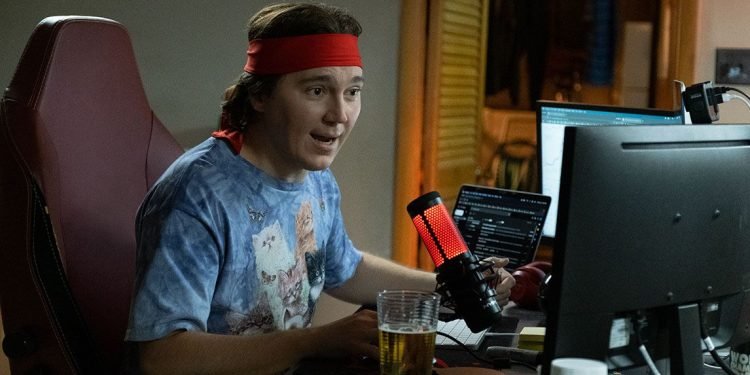This review of Dumb Money comes from the film’s premiere at the 2023 Toronto International Film Festival. The film will be released later in September.
With everyone stuck at home in the late months of 2020 and the early months of 2021, it was hard not to at least be aware of the GameStop short-squeeze saga, a Reddit-fueled stock run that cost major hedge funds billions of dollars. It took the internet by storm with what seemed like an Occupy Wall Street for the meme era. There was plenty of talk about David-vs.-Goliath conflict and the triumph of the small investor, alongside endless memes about “stonks.” For some, it was hilarious revenge on big companies expecting GameStop to fail. For others, it was an offensive manipulation of the American economy by amateurs doing it for lulz. Either way, it was a revolution with an actual impact on Wall Street.
The story also inspired multiple documentaries and docuseries across the various streaming services: Max, Hulu, and Netflix all released their own looks at the GameStop saga. There were also reports of three separate feature films being rushed into development by different studios. The first to see the light of day — Dumb Money, starring Paul Dano, Pete Davidson, and Seth Rogen — is openly out to solicit the same award-season attention granted to a similar fictionalized Wall Street saga, The Big Short.

Photo: TIFF
But Craig Gillespie’s Dumb Money is neither dumb enough to capture the bonkers nature of the story nor smart enough to turn it into an entertaining or even informative tale. The film takes the same approach as every one of the documentaries released on the subject. It’s a surface-level David-versus-Goliath story of internet revolution amid a global pandemic, with the big message that the house always wins, but for a brief moment, the people actually beat the system.
Written and produced by Lauren Schuker Blum and Rebecca Angelo, and based on Ben Mezrich’s book The Antisocial Network, Dumb Money centers on the big players involved in the congressional hearing about the short squeeze. There are the Goliaths, like hedge-fund manager Kenneth C. Griffin (Nick Offerman), who owns Citadel; Melvin Capital investment-firm owner Gabe Plotkin (Seth Rogen), who drove a lot of the shorting of GameStop; and Keith Gill, aka Roaring Kitty on YouTube and DeepFuckingValue on Reddit (Paul Dano). There are also plenty of familiar faces portraying the various retail traders involved in the short squeeze, like Barbie’s America Ferrera as an overworked nurse and Transformers: Rise of the Beasts’ Anthony Ramos as a GameStop clerk. Gillespie uses them to express the film’s sentiments about the social impact of the squeeze and the people-driven market revolution.
The vagueness of those messages provide most of the film’s biggest problems. Where The Big Short was patronizing but still hugely entertaining and legitimately informative, Dumb Money’s creators seem disinterested in explaining what the hell happened with the GameStop scenario, or how the hell it happened. The script assumes the audience is either already familiar with the story, or doesn’t much care about the finance specifics, and just want to see the news reenacted by people they know. Most of the jargon goes unexplained, and the series of events that facilitated the saga is just shrugged off in favor of a simplistic “Isn’t this crazy!?” tone.

Photo: TIFF
Even so, the worst sin Gillespie makes is taking the story too seriously. The movie devotes too much of its runtime to forced emotional beats between accidental revolutionary leader Keith Gill and his family in an attempt to make him a tragic social leader. His rise to power and the potential of losing it all causes some friction with his wife Caroline (Shailene Woodley, in a thankless role that mostly involves just watching from the sidelines in support). Meanwhile, Gill has to deal with his burnout of a brother, Kevin (Pete Davidson, essentially playing himself and stealing every scene he’s in) who believes in Keith’s financial savvy, but not his role as the leader of a movement.
Dumb Money also mostly fails to capture the meme aspect of the GameStop saga, which was an essential element in making the story part of internet history. Words like “tendies” and “diamond hands” are scattered across the script, while “apes together strong” memes and “to the moon” chants are sporadically shown during news montages. But the filmmakers make no attempt to really engage with the culture of stonks or r/WallStreetBets in an attempt to make this a social justice narrative, or let mainstream audiences in on the uniquely 2020s culture that spawned it all.
Granted, omitting most of the toxic culture of r/WallStreetBets isn’t a bad thing. (The film does mention some of the more problematic lingo used in the subreddit.) But ignoring the internet aspect of this internet movement means reframing it as something it isn’t. The GameStop saga was fascinating and important not only because it was about common people making huge amounts of money while the rich investment firms actively rigging the system went bankrupt, but because of the way it was organized and spread through shared gags and internet culture. Keith Gill wasn’t just the accidental face of a movement, he was also the prankster who used a meme during a congressional hearing. Dumb Money captures none of that.
It isn’t inherently a problem that Dumb Money goes for a more dramatic tone than its title and subject matter imply. But the film never manages to capture the thrills and commentary of its big inspiration, David Fincher’s The Social Network, even while borrowing that film’s aesthetic and the tone of its score.
At least Dumb Money is pretty good at capturing the moment when the story took place. The film’s portrayal of life in the first year of the pandemic, the collective anger at corporate bailouts and relief funds, and the misery covered in cloth masks are all displayed in the film painfully accurately. And that setting does help make the “people vs. powers” aspect more resonant. If only the story was actually gripping, or any fun at all.
Dumb Money will premiere in theaters in limited release on Sept. 15, then expand into wide release on Sept. 29.















































